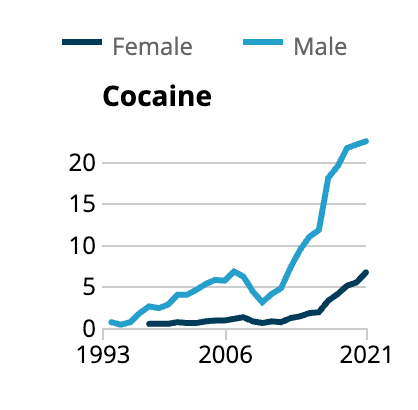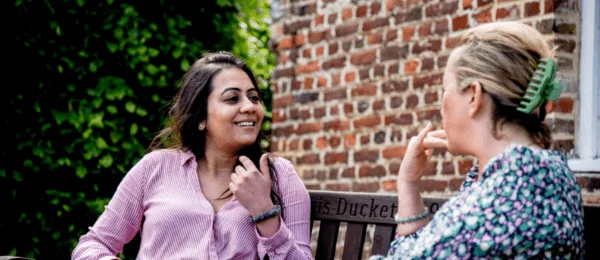Drug problems and support in Bristol
INTRODUCTION
Drug addiction remains a growing concern in Bristol, with the latest figures showing higher levels of drug use in the South West than in any other area of England and Wales.
As you might expect, cannabis is the most common substance used, but it is heroin users who account for nearly all drug-related hospital admissions.
This blog post examines drug use and addiction trends in Bristol, offering an overview of current interventions, care strategies, and local addiction treatment available to those affected by substance abuse and misuse.
The State Of Drug Use In Bristol
Bristol is one of the most affected regions in England, with high levels of recreational and problematic drug use across a range of substances.
Prevalent Drug Types And Use Patterns
In Bristol, there is a high prevalence of drug use compared to the rest of England and Wales. The most commonly used drugs in the city include cocaine, heroin, crack cocaine and cannabis.
The purity of these drugs is increasing in the area, which contributes to an increase in risk-taking behaviour for users.
Research has found injecting drug use prevalent among young people aged 16-24 years old in Bristol, with 15% of needle users reporting injection practices such as sharing needles or syringes and 11% reportedly using public spaces or backyards for consumption purposes.
Research points towards the misuse of previously perceived ‘safe’ substances such as laughing gas nitrous oxide, poppers etc., along with psychedelic compounds 2C-P/B, NBOMe etc.
It was reported that 10% bought their last batch from someone over 25 years old, indicating accessibility to minors for these types of drugs.
Risks And Challenges Faced By Drug Users In Bristol
Bristol has seen a rise in drug use, especially cocaine-related drugs, presenting potentially harmful risks and challenges to users.
This trend is mirrored across the South West – with Bristol particularly affected due to its increasing population size and urban environment.
Once perceived as a low-harm drug, cocaine related drugs are showing a steep climb in mortality figures year on year, according to the Office for National Statistics.

Cocaine Deaths sharply increasing
These issues are addressed by the Bristol Drug & Alcohol Strategy (2021-2025), which aims to reduce the harms caused by drug use through prevention, treatment and addiction recovery services.
For People Who Inject Drugs (PWID) in Bristol, there is an additional risk posed by COVID-19 public health measures and changes to opioid substitution therapy (OST) services that provide clean needles and other harm reduction support for PWIDs.
Stigmas around drug use can further exclude those affected from seeking meaningful help or accessing treatment programmes when needed – creating an atmosphere where those burdened with addiction feel unable or embarrassed to seek out assistance or advice even when it’s desperately required, leading them into increasingly worrying spirals away from proper healthcare and addiction recovery.
Addressing Drug Use And Addiction In BristoL
From an addiction treatment programme to harm reduction strategies and programmes, Bristol is actively taking measures to support those affected by drug and alcohol addictions.
Bristol addiction treatment
Treating addictions in Bristol relies on a range of tailored services. Inpatient treatment programmes provide an intensive rehabilitation experience with 24/7 care from experienced medical staff, allowing for withdrawal symptoms to be closely monitored and managed in a safe environment.
A private rehab clinic also offers comprehensive residential treatment programmes tailored to individuals’ needs and aftercare options once they have completed the detox process—often including individual therapy, group therapy, daily treatment plan, therapies such as dialectical behavioural therapy and life skills courses, all designed to help sufferers stay off drugs upon leaving the clinic.
Additional support can be accessed through local community-based services such as those provided by Bristol Roads (Recovery Orientated Alcohol and Drugs Service https://www.dhi-online.org.uk/get-help/adult-drug-alcohol-treatment/bristol-roads ) which offer culturally sensitive addiction support programs with support including:
1:1 sessions
Structured group programme (including abstinence support groups and mutual aid)
Peer support and training for people wanting to become peers
Specific groups for people using ‘party drugs’
Preparation for detox
Employment, education and training (West of England Works)
Other organisations within the area, such as St George NHS Foundation Trust, provide substance use assessments and referrals for specialist treatment services where needed.
Harm Reduction Strategies And Interventions
Harm reduction strategies are evidence-based public health policies and interventions that aim to reduce the harm associated with drug use.
Harm reduction techniques focus on reducing the risks of drug misuse while also providing education, support services and treatment options for individuals.
In Bristol, local authorities strive to create a safe environment where all citizens can access information, advice and help related to drug use and addiction.
Examples of harm reduction strategies implemented in Bristol include:
- Needle exchanges programmes which provide clean needles, syringes and other injection materials to minimise HIV/AIDS transmission;
- Medication disposal sites located at pharmacies throughout the city which ensure users dispose of unused medications safely;
- Take Home Naloxone Programme, which provides lifesaving antidotes for those experiencing opioid overdose;
- Overdose prevention clinics offering guidance on safer ways of using substances as well as testing for infectious diseases such as hepatitis C;
- Opioid Substitution Therapy (OST), delivered by Drug Service providers across the region, including primary care trusts (PCTs), prisons or GP surgeries where prescriptions are provided alongside psychological support;
- Home detoxification programme enables addicts who have not responded well to OST program to undertake supervised withdrawal processes in their own home; 24/7 helplines are manned by trained professionals who can address emergencies that may arise due to substance abuse.
These measures seek physical safety and promote mental well-being amongst vulnerable communities affected by drugs by providing housing/ employment support and counselling sessions both before & after they embark upon rehabilitation schemes.
Such initiatives are important in helping people successfully reintegrate into society.

Government And Community-Based Support Programs
In Bristol, several government and community-based support programs aim to address drug use and addiction. These include treatment services, harm reduction strategies, drug rehab, alcohol rehab and several other government initiatives.
Treatment Services: Treatment services can be accessed through private rehab services or the NHS mental health service.
Examples of treatment offered in Bristol may include Cognitive Behavioural Therapy (CBT) sessions, group therapy such as Narcotics Anonymous or Alcoholics Anonymous meetings, residential rehab programmes for those struggling with significant risk behaviours and substance addictions, home detox workshops for those unable to attend everyday clinical care sessions due to family responsibilities etc.
telephone counselling lines open 24/7 with specially trained workers who offer guidance on where people can find help in their local area.
Harm Reduction Strategies: Harm reduction strategies exist at both a national level via policy change but also a local level via voluntary organisations like Transform Drug Policy Foundation (TDFP).
These often focus on providing resources such as free needle exchanges or safe injection kits, which help prevent the spread of HIV/AIDS-related illnesses amongst intravenous drug users.
Intervention projects like “Reduce The Risk” run neighbourhood campaigns alongside offering personalised telephone interventions for young adults associated with substance abuse-linked crime activities as part of their holistic approach towards combating drug misuse in the city’s hotspot areas.
Rehabilitation Services: There is an array of public sector-funded services within Bristol that enable individuals from all socioeconomic backgrounds to access basic recovery-focused outpatient support services such as was provided by the Realise charity until its closure; however, other options are still available from charities such as No Limits Project Ltd and Uniting Care.
Some people require referrals to more intensive long-term medical-supported environments. They should access South West Pathways or Avon & Wiltshire Mental Health Partnership Trust referral routes. This could mean gaining admission even when someone has no money available due to suffering life effects from severe dependency issues..
Self help groups are also very well established in the Bristol area, such as Narcotics Anonymous, Cocaine Anonymous and Alcoholics Anonymous.
The Impact Of Drug Use On Bristol’s Communities
Drug misuse and addiction seriously impact Bristol’s communities, from rising crime levels to public health risks.
The Impact Of Drug Use On Bristol’s Communities
Drug misuse and addiction seriously impact Bristol’s communities, from rising crime levels to public health risks.
Crime Rates And Social Issues
In Bristol, the prevalence of drug use is linked to increased crime rates and potential social issues. Data from ‘From Harm to Hope: A 10-year drugs plan to cut crime’ (2021) shows that 30% of recorded cases of possession with intent to supply were related with family disputes or robberies.
Research conducted by PolicyBristol highlighted a 25% rise in heroin use in Bristol between 2016 and 2017 and a 3-fold increase in cocaine offences since 2009/10.
Implementing robust strategies such as The Bristol Safer Options model is essential for addressing these challenges, providing individuals affected by drugs with effective support while reducing violence, exploitation and associated criminal activities of drug misuse.
It is also important to take measures beyond law enforcement efforts to tackle the deep-rooted influences that lead people to addiction.
For instance, 11 Drug Recovery Support Hubs offering treatment services through one-on-one counselling, group therapy sessions and cognitive behavioural therapy located throughout the area were used by more than two thousand individuals last year, according to government figures.
Health Risks And Public Concerns
Drug use in Bristol has become a major public concern, leading to physical and mental health risks among individuals and detriment to the wider communities.
Figures from The Health and Social Care Information Centre suggest that opiate or crack cocaine-related deaths in England have risen by more than 20 percent since 2010.
In Bristol, between 2017 and 2019 there were 99 drug related deaths and nearly 200 people die each year from an alcohol related condition.
Drug misuse is also associated with an increased risk of infections from Hepatitis C (HCV) transmission, soft tissue damage amongst injecting drug users due to shared needles and other paraphernalia, psychological issues such as depression and anxiety, financial instability due to addiction costs, social isolation within families & communities caused by fear of repercussions associated with talking out about drug-related.
Fatal overdoses occur & ultimately, lack in employability potential due to crime-based associated behaviours around drug procurement means people’s lives can spiral downward into chaotic lifestyles, which perpetuates further problems over long periods of time because little positive support was originally offered when it was most needed.
Supporting Those Affected By Drug Addiction
A range of resources is available to individuals and families affected by drug addiction in Bristol, such as charities promoting drug-free lifestyles and advocacy campaigns that aim to address the issue.

Available Resources For Individuals And Families
Several resources are available for individuals and families in Bristol who may be experiencing difficulties related to drug or alcohol use.
The Bristol Drugs Project (BDP) provides free, confidential and non-judgemental support to anyone seeking help regarding their own drug or alcohol use or that of family members or friends.
Through BDP, individuals can access support to reduce their substance misuse through various therapy types, such as cognitive behavioural therapy (CBT) and dialectical behaviour therapy (DBT).
They also provide access to counselling services and 24-hour telephone helplines, and dedicated mentors who meet with clients weekly and offer advice on how best to reduce their substance use.
For younger people aged 18-25, the ROADS’ specialist service is a great resource to access information and support around the issue of drugs and alcohol.
It provides young people with one-on-one counselling sessions within schools, universities, bars and social services centres, as well as providing harm reduction advice specific to the individual’s needs. Furthermore, it offers bespoke support packages built around each person’s requirements for them to make healthier choices about their lifestyle.
Reclaim is another service designed specifically for adults over 25. It focuses on helping them reduce/stop their use of drugs or alcohol by working on cognitive changes required for positive behaviour change.
This can involve accessing programmes such as family counselling; parenting classes; anger management classes; art therapy sessions; and motivational interviewing workshops.
Finally, private treatment services can also be accessed via detox clinics staffed with experienced medical teams who safely guide patients through withdrawal symptoms when quitting harmful substances such as heroin or cocaine.
Family members are typically encouraged to attend rehab together to create a more supportive environment at home after receiving treatment. A benefit of private treatment is that you can sometimes find that you can access treatment at a convenient time and also sometimes move away from your surrounding area to get help in a different environment.
Clinics are regulated by the care quality commission, whose website you can use to access reports on their safety and management. For further information on accessing PROMIS private rehab clinics, please call us today on 01304 841700
Charities And Organisations Promoting Drug-Free Lifestyles
Drug and alcohol addiction is a significant issue in Bristol, and several charities and organisations throughout the city are actively promoting drug-free lifestyles.
Bristol Drugs Project Limited (BDP) is a charity that reduces drug-related deaths, illnesses and other harms caused by drugs or alcohol in Bristol. BDP offers a variety of services such as the Needle and Syringe Program, methadone prescribing, advice and support to problematic drug users, information on drugs and alcohol misuse, counselling services, and more.
The Bristol Counselling Services provide free counselling for adults who are affected by the misuse of drugs or alcohol. They offer a range of therapies such as cognitive behavioural therapy (CBT) to help people cope with their
Advocacy Groups And Campaigns To Address Drug-Related Issues
Addressing drug-related issues in any community demands an open discourse between individuals, law enforcement and government agencies, and healthcare organisations.
Bristol is no different, with advocates, campaigns and non-profits delivering powerful interventions across the city to combat the misuse of drugs.
Some of the key charity initiatives include Bristol Drugs Project (BDP) – launched in 1985 – providing free and confidential support services to anyone affected by drug or alcohol misuse. It offers advice, referrals, counselling services, and residential treatments for individuals facing drug or alcohol dependence.
Other initiatives like DrugWise take a harm reduction approach through education and information dissemination. Their main focus is ensuring everyone in Bristol has access to accurate health data regarding the usage, effects and risks associated with illegal drugs.
They make evidence-based information available online and offline via health providers and community workers.
In addition to this, many local campaigns have taken root that aim to implement behavioural change strategies – such as Bristol City Council’s Drug Strategy 2018–2021 – which looks at ways of improving drug awareness among young people, focusing on areas with high levels of drug supplies, exploring innovative treatment models and reducing reoffending rates in those affected by substance abuse.
Finally, various government initiatives are being employed across Bristol in an attempt to effectively address problems surrounding drug use, including the West of England Combined Authority’s Drug & Alcohol Action Plan 2016–19, which outlines goals related to tackling recurrent offending behaviour among young people, increasing public awareness on substance misuse issues and identifying effective treatment models.
Overall these advocacy groups and campaigns represent a helpful part of bolstering recovery lifestyles within Bristol by providing access to urban communities struggling with addiction services that support therapies, alongside residential detoxification programs for individuals receiving treatment for addiction issues.
By helping members of our communities embrace recovery through direct contact with primary care providers, we can help create paths for recovery from dependency disorders throughout Bristol.

Conclusion: Working Towards A Safer And Healthier Bristol
Drugs have become a growing concern in Bristol, with the South West region having some of the highest levels of drug use in England and Wales.
The drug problem cannot be solved overnight, so continuous investment in treatment services, harm reduction strategies and community-based support programs need to occur to create a safer environment for everyone living in or visiting Bristol.
Residential Rehab Care in Wiltshire is not for everyone; we recognise that reality. We provide a marvellous alternative for those seeking private treatment away from their local area, which provides high-end treatment and boosts health, well-being, and positivity.
Call us today and discover how PROMIS can assist you in accomplishing the fulfilling life you merit.
